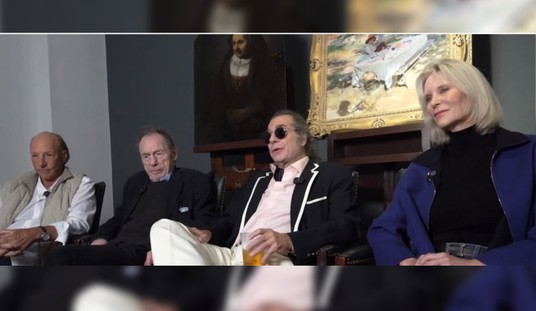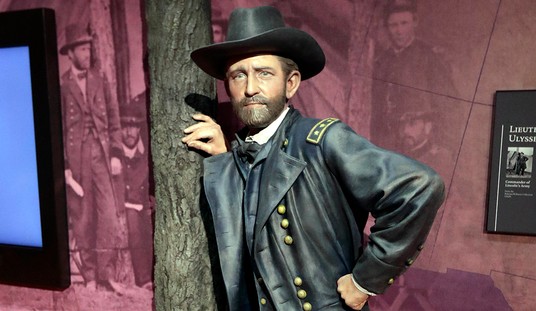Over the weekend I published the first in an ongoing series of book blog posts by me here at PJ Lifestyle: 23 Books for Counterculture Conservatives, Tea Party Occultists, and Capitalist Wizards.
This more than 17,000-word, free, online ebook features six sections of books on a variety of subjects: autobiographies, history, polemics, American exceptionalism, media, and science. (And included throughout are various YouTube videos and custom photos of relevant excerpts.)
The three autobiographies that begin this series each tell a different variation of a story familiar to many PJ readers: the liberal “mugged by reality” reemerging after disappointment as a more tough-minded conservative who recognizes the world’s evil and can call it by name. (Victor Davis Hanson refers to this as the tragic view.)
In reflecting on these narratives, one point often goes unsaid: the journey from Left to Right usually takes awhile — years, sometimes even decades. PJM CEO Roger L. Simon’s Turning Right at Hollywood and Vine, the late Andrew Breitbart’s Righteous Indignation, and leading occult author James Wasserman’s In the Center of the Fire each show as much for men traveling very different careers. For all three the journey out of so-called liberalism required many difficult realizations and personal struggles with both private life experiences and the big national stories.
When one’s ideology fails, a new process of searching for answers begins. The experience resembles a fish out of water flailing about on the shore. One flop forward, another scared slide backwards toward the progressive ocean.
I resisted accepting the “conservative” and “right-wing” labels for years; my own transition from Chomsky reader and Nation subscriber during college in 2005 to conservative new media editor in 2012 came in baby steps. I drifted from the hard left wing of the Democratic Party circa 2006 to the (imagined-in-my-own-head) Centrist Liberal wing of the Democrats by 2008. (Thank two and a half years of pay-the-bills-type jobs while developing my freelance writing career for those small gains.) I then flopped over to a disillusioned, independent “New Centrism” (my own term years before “No Labels”) as Obama came into office and his hard leftism emerged. (What was a radical like Van Jones doing in a “post-ideological” administration? Stanley Kurtz would answer that question.)
Initially I empathized with the polite, “center-right” David Frum/David Brooks-style “sophisticated” conservative circa Fall 2009. During 2010 and 2011 the ideological shift continued into more aggressive Tea Party and anti-jihad positions, though my “social liberalism” still remained. Only in the last year — as I’ve returned to a belief in God and grown certain in my need to someday become a father — does it feel like I’ve come all the way to the Right, thus inspiring an unashamed identification with social conservatism and family values. (That I still support state-level legislation favoring gay marriage for the kind of socially conservative, every-human-being-on-the-face-of-the-earth-needs-to-endeavor-to-get-married reasons that Jonathan Rauch argues in his book can remain an ongoing debate for another day…)
Does this kind of gradual journey sound familiar to anybody else?
Part I: Autobiographies
1. In The Center of the Fire by James Wasserman
Original Publication Date: June 15, 2012
Official Description:
In this daring exposé by a survivor of a unique era in the New York occult scene, James Wasserman, a longtime proponent of the teachings of Aleister Crowley, brings us into a world of candlelit temples, burning incense, and sonorous invocations. The author also shares an intimate look at the New York Underground of the 1970s and introduces us to the company of such avant-garde luminaries as Alejandro Jodorowsky, Harry Smith, and Angus MacLise. A stone’s throw away from the Velvet Underground and Andy Warhol’s Factory, William Burroughs’ “bunker,” and the legendary Chelsea Hotel was a scene far more esoteric than perhaps even they could have imagined.
When James Wasserman joined the O.T.O. in 1976, there were fewer than a dozen members. Today the Order numbers over 4,000 members in 50 countries and has been responsible for a series of ground-breaking publications of Crowley’s works.
The author founded New York City’s TAHUTI Lodge in 1979. He chronicles its early history and provides a window into the heyday of the Manhattan esoteric community. He also breaks his decades of silence concerning one of the most seminal events in the development of the modern Thelemic movement — detailing his role in the 1976 magical battle between Marcelo Motta and Grady McMurtry. Long slandered for his effort to heal the temporary breach between the Orders of A.’.A.’. and O.T.O., James Wasserman sets the record straight. And, he meticulously chronicles the copyright contest over the Crowley literary estate–of which he was an important participant.
This is also a saga with a very human tableau filled with tender romance, passionate friendships, an abiding spiritual hunger, danger, passion, and ecstasy. It also explores several hidden magical byways including the rituals of Voodoo, Tibetan Buddhism, and Sufism. Finally we are given a bird’s eye view of the 1960s hippie culture and its excesses of sex and drugs, and rock n roll–along with the personal transformations and penalties such a lifestyle brought forth.
Reconstructed from personal memories, magical diaries, multiple interviews, court transcripts, witness depositions, trial evidence, and extensive correspondence, this book elucidates a hitherto misreported and ill-understood nexus of modern magical history. It also shares tales of a mythical moment in American life as seen through the eyes of an enthusiastic participant in the hip culture of the day.
Why Counterculture Conservatives Should Read It:
James Wasserman’s memoir accomplishes an elegant feat by juggling three narrative threads: A) his own personal transformation from socialist hippie drug addict in the late ’60s to gun-toting, libertarian family man and influential elder statesman of a new religion, B) the legal and personal battles surrounding Aleister Crowley’s copyrights and the leadership of the Ordo Templi Orientis – the same emotional intensity that inspires one to build religious movements also pushes others to tear them apart, C) the professional transformation from clerk at Weiser’s bookstore to acclaimed book designer, author, and talking head in Discovery and History channel documentaries. These three threads of course connect with our three CounterCon movements.
 In describing the ideological and biographical aspect of Wasserman’s memoir, a good comparison is to PJ Media columnist Ron Radosh and his memoir Commies: A Journey Through the Old Left, the New Left and the Leftover Left. Radosh and Wasserman played comparable roles in their respective movements of the New Left and Thelema, each acting as movement historian and subtle observer of behind-the-scenes events and the larger-than-life, legendary personalities.
In describing the ideological and biographical aspect of Wasserman’s memoir, a good comparison is to PJ Media columnist Ron Radosh and his memoir Commies: A Journey Through the Old Left, the New Left and the Leftover Left. Radosh and Wasserman played comparable roles in their respective movements of the New Left and Thelema, each acting as movement historian and subtle observer of behind-the-scenes events and the larger-than-life, legendary personalities.
And both made their journey from left to right one step at a time over the course of many decades. For Wasserman disillusionment from the organized left came in the late ’60s while working in Washington, D.C., on civil rights and antiwar issues. (He realized that the leaders of the movement admitted they didn’t care if the communists won in Vietnam — or that communism was even a bad thing.) But this just knocked him into more than a decade of wandering around the 1970s New York occult scene. It wouldn’t be until decades later when several life events would deliver the rightward kicks needed for him to eventually come out vocally as an advocate of political liberty. The one that I’ll emphasize here: during the mid-’80s Wasserman decided to purchase a gun to protect himself from some of the crazier individuals in the darker corners of the occult underground. He realized that he bore the responsibility to protect his family and that he could not rely on anyone else.
It’s one thing to live a happy little counterculture existence prancing around in a circle, casting spells and dropping LSD. But the reality is there are evil people out there who don’t want us to have this freedom. If we want to live as counterculturalists then conserving our liberty means having a bigger gun than the other guy, the skill to hit him when we fire, and the courage to pull the trigger before he does. And of course this same principle applies whether the bully is a thug wanting your wallet or a despot enriching uranium.
Why Tea Party Occultists Should Read It:
 Aleister Crowley — the founder of Wasserman’s religion of Thelema and the most influential occultist of the 20th century — has a really bad reputation. Much of this is his own fault but his enemies did a smear job on him that makes today’s mainstream media look as benign as internet comment trolls. Even still today most of the time when mentioning Crowley’s name in an article someone will show up in the comments to insist that he was a child molester and Satanist who drank blood and performed human sacrifice. (Roger L. Simon mentioned the connection between Crowley and Walter Duranty in his speech opening the Duranty awards — subjects to be explored in more depth in future editions of this list as I do more research.)
Aleister Crowley — the founder of Wasserman’s religion of Thelema and the most influential occultist of the 20th century — has a really bad reputation. Much of this is his own fault but his enemies did a smear job on him that makes today’s mainstream media look as benign as internet comment trolls. Even still today most of the time when mentioning Crowley’s name in an article someone will show up in the comments to insist that he was a child molester and Satanist who drank blood and performed human sacrifice. (Roger L. Simon mentioned the connection between Crowley and Walter Duranty in his speech opening the Duranty awards — subjects to be explored in more depth in future editions of this list as I do more research.)
This has its benefits for a young religion; it’s much better if the founder is a jerk who’s very difficult to like. That way the ideas and spiritual teachings have to fall or stand on their own and you’re less likely to idolize the founder and emulate his life.
“Do what thou wilt shall be the whole of the Law” remains the most well known tenet of Crowley’s system of Thelema and most widely misinterpreted. Those who just “dabble” in Occultism as a kind of revolt against the “establishment” Judeo-Christian tradition think that it means “Do whatever you want is the only law you have to live by because you’re a superman better than everyone else. So you can cheat and party and live the life of a hedonist.” (That certainly sounds to be the Duranty reading of it.) People just assume that because Crowley lived as a libertine for periods of his life that sexual promiscuity, drug abuse, racism, Satanism, and anti-Christian rhetoric were natural outgrowths of the religion he founded.
But that’s not the case. And you see it in the lives of people like Wasserman who find God and make themselves better people through nontraditional religious practices. Thelema isn’t a license to be an evil person. The operative word most misinterpreted is “WILL” and it translates the command more like this: “Find your True Will and then pursue performing it with all of your being.” How does one find his True Will? What does that even mean?
The answer is more mundane than those with the Crowley “Great Beast” caricature in their head may suspect. Crowley wrote in Magick Without Tears:
It should never be forgotten for a single moment that the central and essential work of the Magician is the attainment of the Knowledge and Conversation of the Holy Guardian Angel. Once he has achieved this he must of course be left entirely in the hands of that Angel, who can be invariably and inevitably relied upon to lead him to the further great step—crossing of the Abyss and the attainment of the grade of Master of the Temple.
True Will = The Will of God, or God’s plan for you on this earth, which we can find out through invoking angels to tell us and then transform us into the people God wants us to be.
Those thinking that the world of the occult is an escape from the Judeo-Christian tradition are in for a shock should they delve deeper. The reality is that Crowley-influenced occultism relies heavily on Jewish and Christian traditions. Don’t believe me? Wasserman’s previous book, The Temple of Solomon: From Ancient Israel to Secret Societies, featured later on the list, spends almost 400 pages making the argument.
What this means is that it’s time for occultists and those of “alternative” spirituality to recognize that they too are a part of America’s Judeo-Christian heritage — and have a responsibility to participate in defending it from the genocidal antisemites who want to conquer us all. We’re all Jews. Anyone who regards the Bible as a net positive for humanity, worth defending — regardless of their specific beliefs about the meaning of the words written in it — counts as a Jew. And everyone who struggles with God is Israel.
Why Capitalist Wizards Should Read It:
Also tucked into Wasserman’s memoir the reader finds the inspiring story of his multifaceted career in book designing, publishing, writing, and editing. Wasserman played a vital role in the publication of much of Crowley’s work today, perhaps of most importance being Crowley’s Thoth Tarot deck in 1977, for which he also wrote the instructions. (This is my favorite Tarot deck.) Wasserman also produced a stunning edition of The Egyptian Book of the Dead: The Book of Going Forth by Day. The books he designed have an elegant, authoritative quality to them. Spring for the hardback of In the Center of the Fire instead of the Kindle edition.
The important piece to grasp here is the role of writing as it relates to Wasserman’s spirituality and politics. When he founded a new OTO lodge in New York City the name he selected was TAHUTI. Likewise his memoir today is published by Ibis Press. TAHUTI, also known by his Greek name Thoth, was the Egyptian god of the scribes, the inventor of magic, writing, science, peacemaking, and a central figure among the Western occult tradition:
When we spend our entire lives breathing air, how often do we stop and think about the atmosphere we’re stuffing into our lungs? Do we even remember that there’s stuff called air surrounding us? And having always lived in text-based, book-based societies, can we comprehend what it would be like to live in a world without the written word as the common bridge between minds?
Writing is both a technology and a process for analyzing the world; and upon it sits in delicate balance Western civilization’s liberty-based religious culture, political system, and wealth-generating economic engine. Now with his memoir Wasserman can look back and see the truth of this occult theory as he manifested it over the course of his own life: Through the acts of writing and publishing the world can be transformed. Cast a spell and you can shape the world as you Will.
Through the memoir of another counterculture conservative publisher, lost too soon, we see a concrete example of how to implement this principle to address our dire political situation today…

2. Righteous Indignation: Excuse Me While I Save the World! by Andrew Breitbart
Publication Date: April 15, 2011
Official Description:
Known for his network of conservative websites that draws millions of readers everyday, Andrew Breitbart has one main goal: to make sure the “liberally biased” major news outlets in this country cover all aspects of a story fairly. Breitbart is convinced that too many national stories are slanted by the news media in an unfair way.In Righteous Indignation, Breitbart talks about the key issues that Americans face, how he has aligned himself with the Tea Party, and how one needs to deal with the liberal news world head on. Along the way, he details his early years, working with Matt Drudge, The Huffington Post, and so on, and how Breitbart developed his unique style of launching key websites to help get the word out to conservatives all over. A rollicking and controversial read, Breitbart will certainly raise your blood pressure, one way or another.
Why Counterculture Conservatives Should Read It:
I reviewed Righteous Indignation here and wrote about the death of Andrew Breitbart here (focusing on his vital contributions to living counterculture conservatism here.) For the purpose of this list, the aspect of Breitbart’s memoir worth emphasizing is his precise targeting of the enemy. In the chapter “Breakthrough” he provides a succinct summary of…
The Cultural Marxist
For counterculture conservatives the culture is a method for the individual to make himself and his family better people. The task of making a better world begins with the self. Cultural Marxists pursue the opposite: every aspect of culture and every institution must be hijacked and subverted to make other people better by enlightening them to the truths of socialism. Archetypal example and theoretician: Antonio Gramsci.
They too believed that through hijacking the writing of culture, one could transform the world. And they were right. Here’s Breitbart explaining, the section on Cultural Marxism begins at about 3:40…
*
Cultural Marxists devoted decades to slowly infiltrating the publishing industry. But they did not anticipate the role technology plays in transforming culture.
Conservatives don’t have to worry about retaking the cultural institutions that Marxists conquered. We’re perfectly capable of magically building our own replacements, as PJ Media’s CEO revealed in his memoir, republished last year as Turning Right at Hollywood and Vine...

3. Turning Right at Hollywood and Vine: The Perils of Coming Out Conservative in Tinseltown by Roger L. Simon
Republication Date: February 8, 2011 (First published in 2008 as Blacklisting Myself)
Official Description:
An Academy Award–nominated screenwriter and a mystery novelist, Roger L. Simon is the only American writer to pull off the amazing trick of being profiled positively in both Mother Jones and National Review in one lifetime. The stunning story of his political odyssey is told in this memoir, where Simon recounts his migration from financier of the Black Panther Breakfast Program to pioneer blogosphere mogul beloved by the right as a 9/11 Democrat. But Simon is beholden to neither right nor left in this tale of Hollywood chic run a muck, as he talks out of school about his adventures with, among many others, Richard Pryor, Warren Beatty, Timothy Leary, Richard Dreyfuss, Woody Allen, and Julian Semyonov, the Soviet Union’s version of Robert Ludlum and also a KGB colonel who tempted Simon to join the KGB himself. Among the topics covered along the way:Is there a new blacklist in Hollywood, this one targeting conservatives?
Simon’s red-carpet tours of the People’s Republic of China, Cuba, and the Soviet Union with Hollywood screenwriters and famous mystery novelists.
Why Al Gore’s documentary on global warming didn’t deserve the Oscar on artistic grounds alone; and why the Academy’s voting system is so corrupt.And, as they say, there is much, much more besides.
Why Counterculture Conservatives Should Read It:
When I reviewed Roger L. Simon’s memoir for Big Hollywood in July of 2011 I emphasized this quote as my favorite. It serves as another definition of “Counterculture Conservative”:
What I am left with is a collection of ideas with which I have dabbled throughout my life, never fully discarding any of them, even though some are completely contradictory of others. I regard Marxism, Freudianism, libertarianism, laissez-faire capitalism, Zen Buddhism, Quaker pacifism, neoconservatism, neoliberalism, that whole galaxy of isms, as arrows in a quiver to be drawn at will, depending on the adversary or the necessities of the situation. That may sound dangerously close to yet another ism—cultural relativism—but I assure you it is not. I do think there is almost always a good and evil, a right and wrong—although often you have to look closely—and the relativist view of the world is at best lazy and at worst a stalking horse for fascism. Those arrows in my quiver are no more than an arsenal for helping me find that elusive truth. And perhaps for taking action. Sometimes one is not enough. Sometimes I don’t need or want any of them.
“I do think there is almost always a good and evil” = the single most important idea a human being needs to have in their head in order to survive in the real world.
Roger continues to challenge himself religiously and intellectually, as this must-read recent post shows: Why I Fasted on Yom Kippur for the First Time in Twenty… or Is It Thirty… Years
Why Capitalist Wizards Should Read It:
In September I celebrated my one year anniversary of editing full time for PJ Media. Since starting I’ve tried to learn as much as possible from my wiser, more experienced editorial colleagues, especially Roger. Questions on my mind as I pondered my primary task of expanding and growing our readership: What already made PJM successful? What formula did Roger concoct up in his writing office up in the Hollywood Hills that had drawn me and so many others to the publication in the first place? Because it seemed that all that needed to be done was unlock this formula, pinpoint the aspects of PJM that worked and bring them out more to new audiences. But what was the spell?
The answer stares out on every page of Turning Right at Hollywood and Vine. From writing award-winning novels to Oscar-nominated screenplays on to leading PJM to popularity and influence in the blogosphere today, Roger accomplished it all through diligently developing his mastery of the writer’s craft. The secret to creating wealth, value, and a life of happiness: dedicate yourself to becoming great at something and then practice it every day. Then just continue to grow and evolve your skill for a continually changing world.
In future editions of this list I’ll include a section discussing some of the books and techniques Roger recommends for improving as a writer.
*
Having considered three histories of individuals we now turn to the broader historical narrative of the development of Western civilization…
****
Click here to continue with Part II, History: The Temple of Solomon and the Foundations of Western Civilization












Join the conversation as a VIP Member